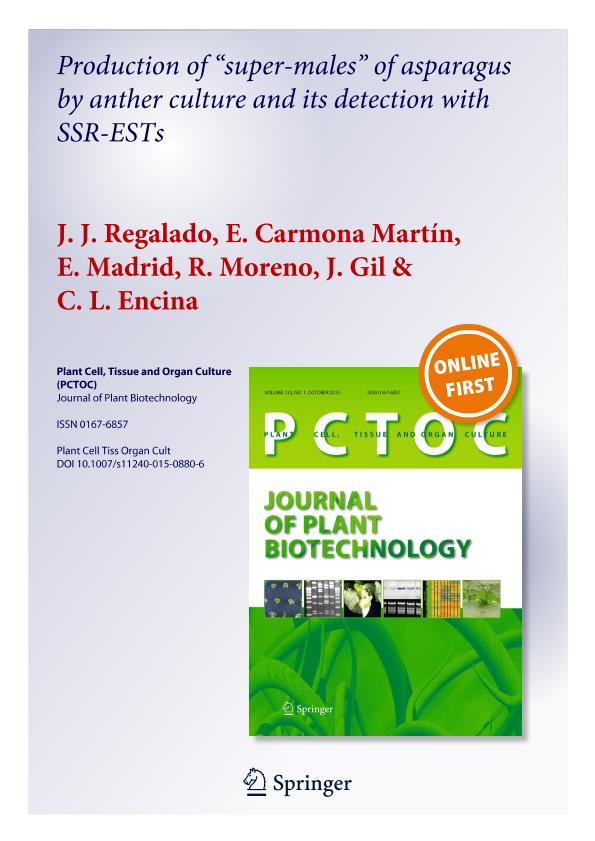Mostrar el registro sencillo del ítem
dc.contributor.author
Regalado González, Jose Javier

dc.contributor.author
Carmona Martín, E.
dc.contributor.author
Madrid, E.
dc.contributor.author
Moreno, R.
dc.contributor.author
Gil, J.
dc.contributor.author
Encina, C. L.
dc.date.available
2018-09-13T18:41:17Z
dc.date.issued
2016-01
dc.identifier.citation
Regalado González, Jose Javier; Carmona Martín, E. ; Madrid, E.; Moreno, R.; Gil, J.; et al.; Production of “super-males” of asparagus by anther culture and its detection with SSR-ESTs; Springer; Plant Cell, Tissue and Organ Culture; 124; 1; 1-2016; 119-135
dc.identifier.issn
0167-6857
dc.identifier.uri
http://hdl.handle.net/11336/59579
dc.description.abstract
Anther culture is used to develop asparagus “super-male” (di-haploids) in asparagus, which can be used to develop “all-male” varieties, by crossing them with suitable females; their progenies will be formed only by males which is advantageous for producers. This report describe a new anther culture protocol adapted to “Morado de Huétor”, a Spanish tetraploid landrace, and studied the different factors involved in callus proliferation success from anther explants such as the microspore development stage, or the type of stress used to induce the symmetric division of the microspores, to obtain a high success rate (90 %). For plantlets regenerates from anther culture (PRACs) regeneration we develop a proliferation media supplemented with a combination of pCPA and BA able to induce callus proliferation and plantlet regeneration in the same step in a 50 % of calli, simplifying the procedure. The high percentage of heterozygous male recovery, originated from somatic cells, is an important problem in the anther culture, and to elucidate the origin of PRACs we have combined different tools: ploidy analysis, characterization with the linked sex-marker Asp1-T7 and with EST-SRRs. We can establish that 50 % of PRACs obtained in this work were regenerated from diploid microspores of “Morado de Huétor”, regenerating diploid, di-diploid and tetra-diploid plantlets. The di-diploids males (MMmm) would generate a ratio male:female of 5:1 (83.3 %) and the tetra-diploid males (MMMMmmmm) a ratio male:female of 69:1 (98.6 %), so the tetra-diploid males could be considered “super-males” and be used to develop “all-male” varieties of “Morado de Huétor”.
dc.format
application/pdf
dc.language.iso
eng
dc.publisher
Springer

dc.rights
info:eu-repo/semantics/openAccess
dc.rights.uri
https://creativecommons.org/licenses/by-nc-sa/2.5/ar/
dc.subject
Haploid
dc.subject
Micropropagation
dc.subject
Organogenesis
dc.subject
Sex-Linked Marker
dc.subject
Somaclonal Variation
dc.subject
&Ldquo;Morado de HuÉTor&Rdquo;
dc.subject.classification
Otras Biotecnología Agropecuaria

dc.subject.classification
Biotecnología Agropecuaria

dc.subject.classification
CIENCIAS AGRÍCOLAS

dc.subject.classification
Otras Ciencias Biológicas

dc.subject.classification
Ciencias Biológicas

dc.subject.classification
CIENCIAS NATURALES Y EXACTAS

dc.title
Production of “super-males” of asparagus by anther culture and its detection with SSR-ESTs
dc.type
info:eu-repo/semantics/article
dc.type
info:ar-repo/semantics/artículo
dc.type
info:eu-repo/semantics/publishedVersion
dc.date.updated
2018-09-13T13:13:35Z
dc.identifier.eissn
1573-5044
dc.journal.volume
124
dc.journal.number
1
dc.journal.pagination
119-135
dc.journal.pais
Países Bajos

dc.journal.ciudad
Dordrecht
dc.description.fil
Fil: Regalado González, Jose Javier. Instituto de Horticultura Subtropical y Mediterránea La Mayora; España. Consejo Superior de Investigaciones Científicas; España. Universidad de Málaga; España. Consejo Nacional de Investigaciones Científicas y Técnicas; Argentina
dc.description.fil
Fil: Carmona Martín, E.. Instituto de Horticultura Subtropical y Mediterránea La Mayora; España. Consejo Superior de Investigaciones Científicas; España. Universidad de Málaga; España
dc.description.fil
Fil: Madrid, E.. Instituto de Agricultura Sostenible; España. Consejo Superior de Investigaciones Científicas; España
dc.description.fil
Fil: Moreno, R.. Universidad de Córdoba; España
dc.description.fil
Fil: Gil, J.. Universidad de Córdoba; España
dc.description.fil
Fil: Encina, C. L.. Instituto de Horticultura Subtropical y Mediterránea La Mayora; España. Consejo Superior de Investigaciones Científicas; España. Universidad de Málaga; España
dc.journal.title
Plant Cell, Tissue and Organ Culture

dc.relation.alternativeid
info:eu-repo/semantics/altIdentifier/doi/http://dx.doi.org/10.1007/s11240-015-0880-6
dc.relation.alternativeid
info:eu-repo/semantics/altIdentifier/url/https://link.springer.com/article/10.1007%2Fs11240-015-0880-6
Archivos asociados
